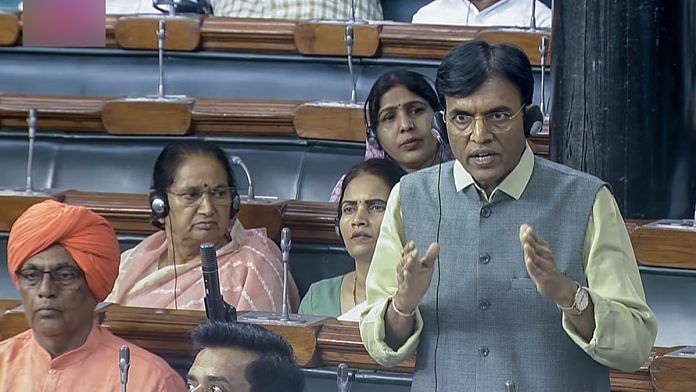New Delhi: The passing of The Jan Vishwas (Amendment of Provisions) Bill, 2022 in the Lok Sabha will not dilute the provisions of the Drugs and Cosmetics Act, 1940, the health ministry has clarified, adding that the proposed legislation is aimed at decriminalising minor offences and promoting ease of doing business.
In a statement Friday, the ministry said Section 27 of the Act specifies that adulterated or spurious drugs leading to death or grievous injury may invite a maximum punishment of life imprisonment while an adulterated drug that does not lead to death or grievous injury or which is prepared without a licence can attract imprisonment of up to five years.
Further, a provision in the Act provides for imprisonment of up to seven years in the case of spurious drugs that do not lead to death or grievous injury, while all other cases (as specified under Section 27D of the Drugs and Cosmetics Act, 1940), other than the three categories listed above, may lead to imprisonment of up to two years.
Passed with a voice vote in the Lower House Thursday, The Jan Vishwas (Amendment of Provisions) Bill, 2022 proposes to make Section 27D of the Drugs and Cosmetics Act, 1940 “compoundable” — leaving room for the complainant and the accused to reach an out-of-court compromise.
The health ministry in its statement insisted that the quantum of punishment prescribed under Section 27D has not been reduced.
“If found guilty, the imprisonment is still not less than one year which may extend to two years,” it said, adding that the offence has “not been decriminalised but compounding has been offered as a mechanism for resolution of the litigation”.
The ministry specified that any drug which fails safety parameters, has been identified to be injurious to health or may cause bodily injury or death, contains toxic substances, is manufactured in unsanitary conditions or manufactured without a licence is not covered under the proposed amendment and will continue to attract stringent criminal provisions.
The amendment, according to the statement, will also not apply to any drug that contains any substance that reduces its quality or strength, is manufactured under a name which belongs to another drug, contains labels or packaging to imitate another drug with an intent to deceive, or is manufactured in violation of any prohibitions.
The clarification comes in the backdrop of concerns raised over the provisions in the Bill by public health activist Dinesh Thakur who wrote on Twitter Thursday that the proposed legislation “fulfils a long-standing wish list of the industry that if you suffer bodily harm from substandard medicine, no one will belong-standing held punitively accountable”.
2/3
pharmacists who "compound, prepare, mix or dispense" medicine.
The just passed Jan Vishwas Bill decriminalizes this provision too. It replaces punishment for violation of section 42 of the Pharmacy Act 1948 which had a prison term of six months with a monetary file of 1 lac
— Dinesh S. Thakur (@d_s_thakur) July 28, 2023
Thakur added that the Bill “replaces punishment for violation of section 42 of the Pharmacy Act 1948 which had a prison term of six months with a monetary file of 1 lac” for pharmacists who “compound, prepare, mix or dispense” medicine.
(Edited by Amrtansh Arora)
Also Read: No dent in Indian pharma exports despite quality concerns over cough syrups, data shows



